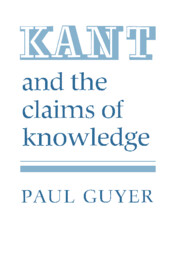Book contents
- Frontmatter
- Contents
- Acknowledgments
- Note on sources
- Introduction
- Part I Kant's early view
- Part II The transcendental deduction from 1781 to 1787
- 3 The real premises of the deduction
- 4 The deduction from knowledge of objects
- 5 The deduction and apperception
- Part III The principles of empirical knowledge
- Part IV The refutation of idealism
- Part V Transcendental idealism
- Afterword
- Notes
- Index of passages cited
- General index
3 - The real premises of the deduction
Published online by Cambridge University Press: 09 March 2010
- Frontmatter
- Contents
- Acknowledgments
- Note on sources
- Introduction
- Part I Kant's early view
- Part II The transcendental deduction from 1781 to 1787
- 3 The real premises of the deduction
- 4 The deduction from knowledge of objects
- 5 The deduction and apperception
- Part III The principles of empirical knowledge
- Part IV The refutation of idealism
- Part V Transcendental idealism
- Afterword
- Notes
- Index of passages cited
- General index
Summary
We have now seen that Kant's initial attempts to deduce the objective validity of the categories of the understanding from a transcendental theory of experience were characterized by a fundamental ambivalence about the conception of experience to be assumed, and that they left room for uncertainty about the type of necessity to be assigned to the conditions of the possibility of such experience. We will now see that Kant continued in some confusion about the best premise for a transcendental deduction throughout the 1780s, but also that he took an unprecedented turn to the strong view that the mind actually imposes conformity to the conditions necessary for its experience on objects, and is not just restricted by those conditions to the experience of objects which do as a matter of fact conform to them. Yet even this view, especially predominant in the first version of the transcendental deduction in 1781, was not asserted unequivocally. Because of these uncertainties, it was inevitable that the deduction, which should have been the keystone to the triumphal arch of the Critique of Pure Reason, never amounted to more than a disjointed summary of significantly different strategies. Moreover, none of these strategies is free from serious problems, and in the end the “key to metaphysics” which Kant had been promising since 1772 (10:130) remains little more than another promissory note for the theory of time-determination eventually worked out in the “Analogies of Experience” but completed only by the “Refutation of Idealism,” which was first added to the text of the Critique in 1787 and perfected only in the next half-dozen years.
- Type
- Chapter
- Information
- Kant and the Claims of Knowledge , pp. 73 - 90Publisher: Cambridge University PressPrint publication year: 1987



